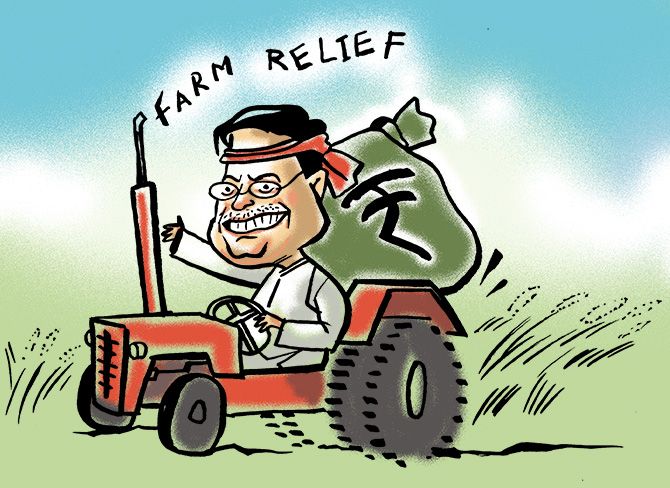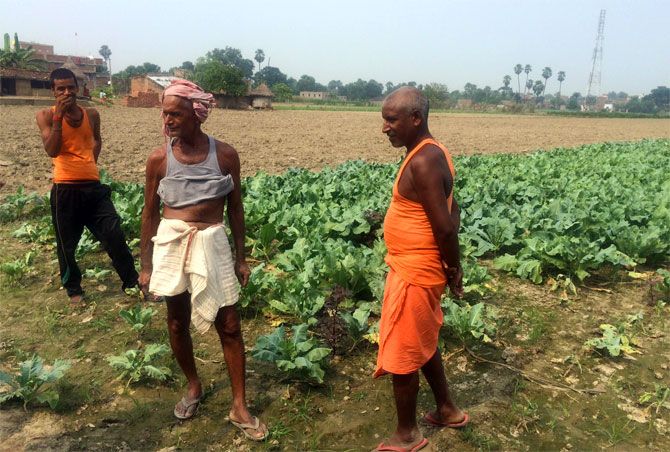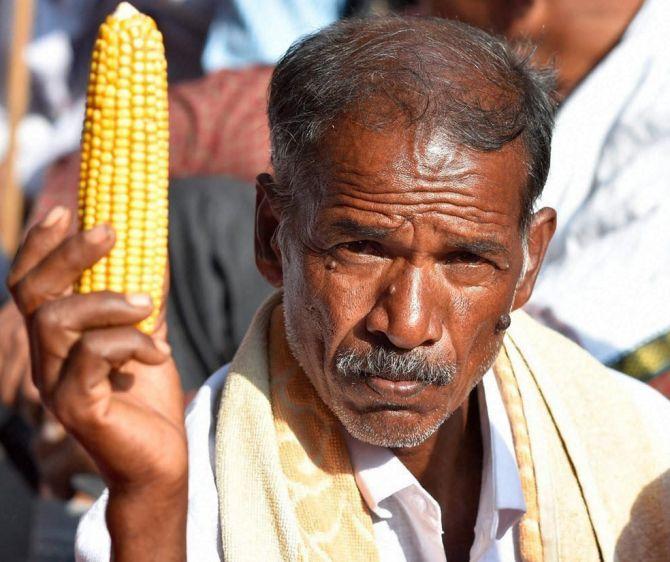The formula for success of farm economy is very simple -- farmers should be able to produce more from the same piece of land at reduced cost while minimising risk and be connected to market to get higher realisation for their produce, points out Siraj Chaudhry.
Illustration: Dominic Xavier/Rediff.com.

The agriculture sector was quite the focus in the Union Budget 2018-19 and that continued in the interim Budget presented on February 1, 2019.
Proposals addressing growth of farmer income and stimulating rural economy found centerstage in the announcements.
Whether it is the direct income support scheme launched, interest subvention on farm loans to farmers' animal husbandry and fisheries or increased Mahatma Gandhi National Rural Employment Guarantee Act (MGNREGA) outlay, all these initiatives aim to help tackle rural distress and increased remuneration for farmers in the longer run.
In my view, four key areas that need work include:
1. Direct benefit transfers to farmers
While a lot of measures have already been initiated by the government, this budget saw the introduction of the PM Kisan Plan that will transfer additional direct income of Rs 6,000 per year to small holder farmers holding under 2 hectares of land.
We need to see good implementation of Direct Benefit transfers (DBT) so that it can work for betterment of farmers giving them the freedom to operate as per market demands.
But this requires an accurate assessment of land records and a plan to include farmers who are not land owners.
Additionally, it will not distort market with increased focus on few crops, leakage of subsidised inputs and unsustainable agricultural production.
DBT is aimed at reducing agrarian distress and supplement government's efforts of doubling farmers' income by easing farmers' financial burden.
This needs to be done in parallel with replacement of all fertiliser, electricity, irrigation and other similar subsidies to make direct income transfer programmes effective.
States such as Odisha and Telangana, have already adopted such programmes over farm loan waivers that have been the traditional recourse.

2. Improving farm productivity
This can be done by focusing on farm mechanisation, leveraging technology at farm level, investing in seed and biotechnology.
In India, mechanisation of agriculture has been in progress at a reasonable pace but we need to embrace it more widely for it to show results.
Deploying technology in the farm sector helps farmers not just in improving farm and labour efficiency, but improvements in both quantity and quality as well as value addition of farm produce with better utilisation of natural resources.
With India in this phase of IT revolution, the need for integrating technology comes largely from the fact that India's population is rapidly increasing with limited natural resources available.
And this while consumers are becoming more and more aware and health conscious demanding transparency and traceability even in developing markets like India.
With advances in biotechnology, farmers can use a wide variety of new bioscience technologies to increase yields while reducing costs.
It can help in producing high-nutrient staple crops which can combat undernourishment and enhance food utilisation.
Biotechnology, thus, is quite an essential for countries like India, where malnutrition and poverty remain serious concerns.

3. Connect farmers to markets and food processing industry
Better integration with focus on agri-exports, National Agriculture Market or fast tracking eNAM, etc are all good initiatives working towards improvement of the Indian farm economy.
However, there is still a need for greater farmer: market linkage.
If the focus is on producing what the market needs, the demand and remuneration will automatically scale upwards.
The industry is already playing a vital role in enabling the farmers to shift from traditional crops to more remunerative crops.
Emphasis on educating the farmers to deal with markets is also essential.
Imparting entrepreneurial skills to the youth so that they can be confident in understanding future markets, working the crop economics etc.
From the government side, a balance is needed between protecting farmers' interests through the use of subsidies, price floors or trade barriers and consumer interests as this may come in the form of higher prices for consumers.
p>
4. Risk mitigation
For a large number of farmers in India, uncertain weather conditions affecting crops and insecure land ownership are major concerns.
The interest subvention scheme announced of two per cent interest subvention for farmers hit by natural calamities, while offering three per cent more to them for timely loan payment will aid farm income increase.
On the other hand, technology that is available needs to be deployed to reduce risk in areas of weather prediction, soil improvement, dry land farming, seed, pesticides, fertilisers, irrigation, farm equipment and delivering services in the form of financing, crop insurance and agri extension.
All this will help farmers invest in better sustainable production tools with even better approach to help them mitigate climatic risks.
Along with this the government also needs to ensure farmers get linked to the banking system in order to strengthen their access to finance.
The formula for success of farm economy is very simple -- farmers should be able to produce more from the same piece of land at reduced cost while minimising risk and be connected to market to get higher realisation for their produce. These measures should be focused on by the government (with the support from industry of course) as a combination of risk mitigation and reward enhancement for the large Indian population dependent on agriculture for their livelihood.
Siraj Chaudhry is senior advisor, Cargill India.












 © 2025
© 2025